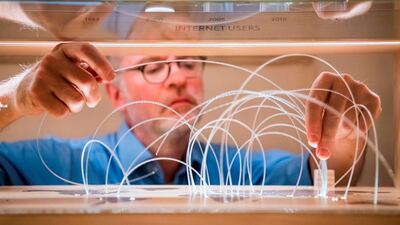The 2019 Nobel Prize in Chemistry was awarded to John B Goodenough, M Stanley Whittingham and Akira Yoshino for the development of lithium-ion batteries.
The Nobel Committee said: "Lithium-ion batteries have revolutionised our lives and are used in everything from mobile phones to laptops and electric vehicles.
"Through their work, this year's Chemistry Laureates have laid the foundation of a wireless, fossil fuel-free society."
The award comes a 9-million kronor (Dh3.33 million) cash prize to be shared by the three, as well as a gold medal and a diploma.
Seeking an alternative source of power during the oil crisis of the 1970s, Whittingham discovered a way to harness the potential energy in lithium, a metal so light it floats on water.
He constructed a battery partly made of lithium that utilised the element's natural tendency to shed electrons, thereby transferring energy.
However the battery was too unstable to be used.
Dr Goodenough - at 97 the oldest person to be awarded a Nobel prize - built on Dr Whittingham's prototype, substituting a different metal compound and doubling the potential energy of the battery to four volts.
This paved the way for far more powerful and durable batteries in the future.
In 1985, Dr Yoshino instead used a carbon-based material that stores lithium ions, finally rendering the battery commercially viable.
The culmination of the trio's research resulted in the most powerful, lightweight and rechargeable battery ever seen.
When asked what type of researcher he is, Yoshino told a Tokyo press conference that a good scientist needed two qualities.
"One thing is that you have to have a flexible brain. Flexibility. The other is tenacity. You stay persistent and never give up," he said.
The laureates and five other Nobel winners receive them at a ceremony in Stockholm on December 10, the anniversary of Swedish inventor Alfred Nobel's death in 1896.
The sixth one, the Peace Prize, is handed out in Oslo, Norway, on the same day.


